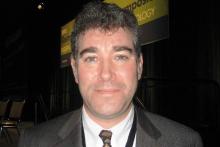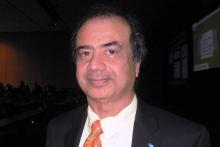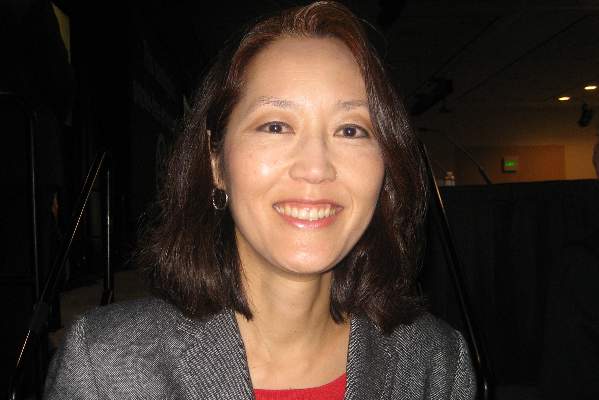User login
SAN FRANCISCO – An investigational kinase inhibitor that blocks the MET signaling pathway is highly active and well tolerated in patients with gastric and related cancers that have amplification of the MET gene, according to a trial a reported at the annual Gastrointestinal Cancers Symposium.
Nearly two-thirds of such patients in the open-label phase 1 trial had a response to AMG 337, an oral, potent, and highly selective inhibitor of c-Met, reported lead investigator Dr. Eunice L. Kwak, a medical oncologist at the Massachusetts General Hospital, Boston.
“Dramatic responses to AMG 337 were observed in a subset of patients with MET-amplified esophagogastric cancers. This demonstrates that MET amplification is an oncogenic driver in some of these cancers,” she contended at the meeting, cosponsored by the AGA Institute, the American Society of Clinical Oncology, ASTRO, and the Society of Surgical Oncology .
The dose-limiting toxicity was headache, seen at any grade in half of the entire trial population and at grade 3 or 4 in about one-tenth. “This is an interesting toxicity thought to occur because of AMG’s binding of the adenosine transporter,” Dr. Kwak noted. “Interestingly, caffeine seems to ameliorate the headaches that people experience on this trial. A cup of coffee is part of the management strategy that we use for patients who get headaches while being treated.”
In an interview, session chair Dr. Peter C. Enzinger, who is director of the Center for Esophageal and Gastric Cancer at the associated Dana-Farber Cancer Institute but did not participate in the trial, said, “Certainly, these data suggest that there are a subgroup of patients that can respond to MET inhibition. [The investigators] have used amplification, and perhaps it is that group of patients that should be considered further for this type of therapy.”
“The problem is that unfortunately, not the majority of [unselected] patients respond to this type of therapy, and until we can better select patients or find better MET inhibitors, this drug is probably going to have difficulty having a positive result in a randomized, phase III study,” he added. “It will also be pretty difficult if we are only treating patients who have amplifications to find enough patients to do a large-scale study.”
Dr. Kwak and her coinvestigators enrolled 90 adults with a variety of advanced solid cancers in the Amgen-sponsored trial. The median number of prior therapies was two.
The patients were treated according to a dose-escalation scheme with AMG 337 until progression or unacceptable toxicity, or were enrolled as part of an expansion cohort that required MET-amplified cancers (established by fluorescence in situ hybridization or next-generation sequencing) and entailed treatment with the maximum tolerated dose of 300 mg daily.
Results showed that among all 90 patients, the rate of grade 3 or 4 adverse events was 21%. The most common was headache, seen in 8%.
Just 11% of patients overall had a response according to RECIST (Response Evaluation Criteria in Solid Tumors) criteria; of note, all had tumors showing either MET amplification or MET overexpression.
Among the 13 patients who had gastric, esophageal, or gastroesophageal junction cancers with MET amplification, the response rate was 62%.
“Patients responses have been rapid. The time to response has been 4 weeks in those patients experiencing tumor shrinkage and symptomatic improvement quickly,” Dr. Kwak noted. “Patients have been on treatment sometimes for extended periods of time. … In particular, there are several patients who have been on study for approximately 2 years or more. Of note, of the nine patients who did not have MET amplification in the esophagogastric cancers, none achieved a partial response.”
On the basis of these positive findings, the investigators plan a follow-on single-arm phase II trial among patients with MET-amplified esophagogastric and other cancers, according to Dr. Kwak.
Contrasting with this trial, another presented in the same session by Dr. Manish A. Shah, an associate professor at the Cornell University in New York, had negative findings with onartuzumab, an investigational anti-MET antibody.
A total of 123 patients with HER2-negative metastatic gastroesophageal adenocarcinoma were enrolled in the randomized phase II trial, which was sponsored by Hoffmann-La Roche with collaboration of Genentech, manufacturer of the antibody. The patients were treated with the modified FOLFOX6 chemotherapy regimen plus either placebo or onartuzumab.
Results showed no significant progression-free survival benefit of onartuzumab in the trial population overall or in the patients whose tumors overexpressed MET as determined by immunohistochemistry (IHC), Dr. Shah reported. There was also no signal of benefit in any of a variety patient subgroups.
“One of the main questions of this study is how do we identify tumors that are truly MET driven. Is it IHC? Perhaps it’s amplification, or perhaps it’s something else. I think that’s the main question for MET inhibition moving forward,” commented Dr. Shah.
Dr. Enzinger, the session chair, commented, “This study I think just shows that using immunohistochemistry as a selector probably is not the ideal way of moving forward with this particular pathway, and that this drug, onartuzumab, probably shouldn’t be pursued further in this particular arena.”
Invited discussant Dr. Jaffer A. Ajani, a professor at the University of Texas MD Anderson Cancer Center, Houston, commented, “AMG 337 showed impressive cytotoxic or cytoreductive activity. Granted, it’s only 13 patients, but in 13 patients, 8 is a big number. So here we can say that the biomarker is good and the drug is good, and this should really be pursued further.”
The literature and clinical experience suggest that resistance to this agent will emerge, he added; therefore, combinations of inhibitors of MET and other pathways should be explored.
On the other hand, “antibodies that inhibit the MET receptor have not produced reliable results,” Dr. Ajani maintained, although it is unclear whether the biomarker, the antibody, or both are problematic in this case.
“The solution to the problem is to develop a conjugate—I just call it MET-BOMB – where you can take the antibody and hook it up to a [toxin-]conjugate. In this way, you can make the drug better and you can make the biomarker more relevant,” he concluded.
SAN FRANCISCO – An investigational kinase inhibitor that blocks the MET signaling pathway is highly active and well tolerated in patients with gastric and related cancers that have amplification of the MET gene, according to a trial a reported at the annual Gastrointestinal Cancers Symposium.
Nearly two-thirds of such patients in the open-label phase 1 trial had a response to AMG 337, an oral, potent, and highly selective inhibitor of c-Met, reported lead investigator Dr. Eunice L. Kwak, a medical oncologist at the Massachusetts General Hospital, Boston.
“Dramatic responses to AMG 337 were observed in a subset of patients with MET-amplified esophagogastric cancers. This demonstrates that MET amplification is an oncogenic driver in some of these cancers,” she contended at the meeting, cosponsored by the AGA Institute, the American Society of Clinical Oncology, ASTRO, and the Society of Surgical Oncology .
The dose-limiting toxicity was headache, seen at any grade in half of the entire trial population and at grade 3 or 4 in about one-tenth. “This is an interesting toxicity thought to occur because of AMG’s binding of the adenosine transporter,” Dr. Kwak noted. “Interestingly, caffeine seems to ameliorate the headaches that people experience on this trial. A cup of coffee is part of the management strategy that we use for patients who get headaches while being treated.”
In an interview, session chair Dr. Peter C. Enzinger, who is director of the Center for Esophageal and Gastric Cancer at the associated Dana-Farber Cancer Institute but did not participate in the trial, said, “Certainly, these data suggest that there are a subgroup of patients that can respond to MET inhibition. [The investigators] have used amplification, and perhaps it is that group of patients that should be considered further for this type of therapy.”
“The problem is that unfortunately, not the majority of [unselected] patients respond to this type of therapy, and until we can better select patients or find better MET inhibitors, this drug is probably going to have difficulty having a positive result in a randomized, phase III study,” he added. “It will also be pretty difficult if we are only treating patients who have amplifications to find enough patients to do a large-scale study.”
Dr. Kwak and her coinvestigators enrolled 90 adults with a variety of advanced solid cancers in the Amgen-sponsored trial. The median number of prior therapies was two.
The patients were treated according to a dose-escalation scheme with AMG 337 until progression or unacceptable toxicity, or were enrolled as part of an expansion cohort that required MET-amplified cancers (established by fluorescence in situ hybridization or next-generation sequencing) and entailed treatment with the maximum tolerated dose of 300 mg daily.
Results showed that among all 90 patients, the rate of grade 3 or 4 adverse events was 21%. The most common was headache, seen in 8%.
Just 11% of patients overall had a response according to RECIST (Response Evaluation Criteria in Solid Tumors) criteria; of note, all had tumors showing either MET amplification or MET overexpression.
Among the 13 patients who had gastric, esophageal, or gastroesophageal junction cancers with MET amplification, the response rate was 62%.
“Patients responses have been rapid. The time to response has been 4 weeks in those patients experiencing tumor shrinkage and symptomatic improvement quickly,” Dr. Kwak noted. “Patients have been on treatment sometimes for extended periods of time. … In particular, there are several patients who have been on study for approximately 2 years or more. Of note, of the nine patients who did not have MET amplification in the esophagogastric cancers, none achieved a partial response.”
On the basis of these positive findings, the investigators plan a follow-on single-arm phase II trial among patients with MET-amplified esophagogastric and other cancers, according to Dr. Kwak.
Contrasting with this trial, another presented in the same session by Dr. Manish A. Shah, an associate professor at the Cornell University in New York, had negative findings with onartuzumab, an investigational anti-MET antibody.
A total of 123 patients with HER2-negative metastatic gastroesophageal adenocarcinoma were enrolled in the randomized phase II trial, which was sponsored by Hoffmann-La Roche with collaboration of Genentech, manufacturer of the antibody. The patients were treated with the modified FOLFOX6 chemotherapy regimen plus either placebo or onartuzumab.
Results showed no significant progression-free survival benefit of onartuzumab in the trial population overall or in the patients whose tumors overexpressed MET as determined by immunohistochemistry (IHC), Dr. Shah reported. There was also no signal of benefit in any of a variety patient subgroups.
“One of the main questions of this study is how do we identify tumors that are truly MET driven. Is it IHC? Perhaps it’s amplification, or perhaps it’s something else. I think that’s the main question for MET inhibition moving forward,” commented Dr. Shah.
Dr. Enzinger, the session chair, commented, “This study I think just shows that using immunohistochemistry as a selector probably is not the ideal way of moving forward with this particular pathway, and that this drug, onartuzumab, probably shouldn’t be pursued further in this particular arena.”
Invited discussant Dr. Jaffer A. Ajani, a professor at the University of Texas MD Anderson Cancer Center, Houston, commented, “AMG 337 showed impressive cytotoxic or cytoreductive activity. Granted, it’s only 13 patients, but in 13 patients, 8 is a big number. So here we can say that the biomarker is good and the drug is good, and this should really be pursued further.”
The literature and clinical experience suggest that resistance to this agent will emerge, he added; therefore, combinations of inhibitors of MET and other pathways should be explored.
On the other hand, “antibodies that inhibit the MET receptor have not produced reliable results,” Dr. Ajani maintained, although it is unclear whether the biomarker, the antibody, or both are problematic in this case.
“The solution to the problem is to develop a conjugate—I just call it MET-BOMB – where you can take the antibody and hook it up to a [toxin-]conjugate. In this way, you can make the drug better and you can make the biomarker more relevant,” he concluded.
SAN FRANCISCO – An investigational kinase inhibitor that blocks the MET signaling pathway is highly active and well tolerated in patients with gastric and related cancers that have amplification of the MET gene, according to a trial a reported at the annual Gastrointestinal Cancers Symposium.
Nearly two-thirds of such patients in the open-label phase 1 trial had a response to AMG 337, an oral, potent, and highly selective inhibitor of c-Met, reported lead investigator Dr. Eunice L. Kwak, a medical oncologist at the Massachusetts General Hospital, Boston.
“Dramatic responses to AMG 337 were observed in a subset of patients with MET-amplified esophagogastric cancers. This demonstrates that MET amplification is an oncogenic driver in some of these cancers,” she contended at the meeting, cosponsored by the AGA Institute, the American Society of Clinical Oncology, ASTRO, and the Society of Surgical Oncology .
The dose-limiting toxicity was headache, seen at any grade in half of the entire trial population and at grade 3 or 4 in about one-tenth. “This is an interesting toxicity thought to occur because of AMG’s binding of the adenosine transporter,” Dr. Kwak noted. “Interestingly, caffeine seems to ameliorate the headaches that people experience on this trial. A cup of coffee is part of the management strategy that we use for patients who get headaches while being treated.”
In an interview, session chair Dr. Peter C. Enzinger, who is director of the Center for Esophageal and Gastric Cancer at the associated Dana-Farber Cancer Institute but did not participate in the trial, said, “Certainly, these data suggest that there are a subgroup of patients that can respond to MET inhibition. [The investigators] have used amplification, and perhaps it is that group of patients that should be considered further for this type of therapy.”
“The problem is that unfortunately, not the majority of [unselected] patients respond to this type of therapy, and until we can better select patients or find better MET inhibitors, this drug is probably going to have difficulty having a positive result in a randomized, phase III study,” he added. “It will also be pretty difficult if we are only treating patients who have amplifications to find enough patients to do a large-scale study.”
Dr. Kwak and her coinvestigators enrolled 90 adults with a variety of advanced solid cancers in the Amgen-sponsored trial. The median number of prior therapies was two.
The patients were treated according to a dose-escalation scheme with AMG 337 until progression or unacceptable toxicity, or were enrolled as part of an expansion cohort that required MET-amplified cancers (established by fluorescence in situ hybridization or next-generation sequencing) and entailed treatment with the maximum tolerated dose of 300 mg daily.
Results showed that among all 90 patients, the rate of grade 3 or 4 adverse events was 21%. The most common was headache, seen in 8%.
Just 11% of patients overall had a response according to RECIST (Response Evaluation Criteria in Solid Tumors) criteria; of note, all had tumors showing either MET amplification or MET overexpression.
Among the 13 patients who had gastric, esophageal, or gastroesophageal junction cancers with MET amplification, the response rate was 62%.
“Patients responses have been rapid. The time to response has been 4 weeks in those patients experiencing tumor shrinkage and symptomatic improvement quickly,” Dr. Kwak noted. “Patients have been on treatment sometimes for extended periods of time. … In particular, there are several patients who have been on study for approximately 2 years or more. Of note, of the nine patients who did not have MET amplification in the esophagogastric cancers, none achieved a partial response.”
On the basis of these positive findings, the investigators plan a follow-on single-arm phase II trial among patients with MET-amplified esophagogastric and other cancers, according to Dr. Kwak.
Contrasting with this trial, another presented in the same session by Dr. Manish A. Shah, an associate professor at the Cornell University in New York, had negative findings with onartuzumab, an investigational anti-MET antibody.
A total of 123 patients with HER2-negative metastatic gastroesophageal adenocarcinoma were enrolled in the randomized phase II trial, which was sponsored by Hoffmann-La Roche with collaboration of Genentech, manufacturer of the antibody. The patients were treated with the modified FOLFOX6 chemotherapy regimen plus either placebo or onartuzumab.
Results showed no significant progression-free survival benefit of onartuzumab in the trial population overall or in the patients whose tumors overexpressed MET as determined by immunohistochemistry (IHC), Dr. Shah reported. There was also no signal of benefit in any of a variety patient subgroups.
“One of the main questions of this study is how do we identify tumors that are truly MET driven. Is it IHC? Perhaps it’s amplification, or perhaps it’s something else. I think that’s the main question for MET inhibition moving forward,” commented Dr. Shah.
Dr. Enzinger, the session chair, commented, “This study I think just shows that using immunohistochemistry as a selector probably is not the ideal way of moving forward with this particular pathway, and that this drug, onartuzumab, probably shouldn’t be pursued further in this particular arena.”
Invited discussant Dr. Jaffer A. Ajani, a professor at the University of Texas MD Anderson Cancer Center, Houston, commented, “AMG 337 showed impressive cytotoxic or cytoreductive activity. Granted, it’s only 13 patients, but in 13 patients, 8 is a big number. So here we can say that the biomarker is good and the drug is good, and this should really be pursued further.”
The literature and clinical experience suggest that resistance to this agent will emerge, he added; therefore, combinations of inhibitors of MET and other pathways should be explored.
On the other hand, “antibodies that inhibit the MET receptor have not produced reliable results,” Dr. Ajani maintained, although it is unclear whether the biomarker, the antibody, or both are problematic in this case.
“The solution to the problem is to develop a conjugate—I just call it MET-BOMB – where you can take the antibody and hook it up to a [toxin-]conjugate. In this way, you can make the drug better and you can make the biomarker more relevant,” he concluded.
AT THE GASTROINTESTINAL CANCERS SYMPOSIUM
Key clinical point: AMG 337 promoted tumor regression in patients with MET-amplified esophagogastric cancers.
Major finding: The response rate was 62% among patients with MET-amplified gastric, esophageal, or gastroesophageal junction cancer.
Data source: A phase 1 trial among 90 patients with various types of advanced solid cancers.
Disclosures: Dr. Kwak disclosed that she receives research funding from Amgen. The trial was sponsored by Amgen.




